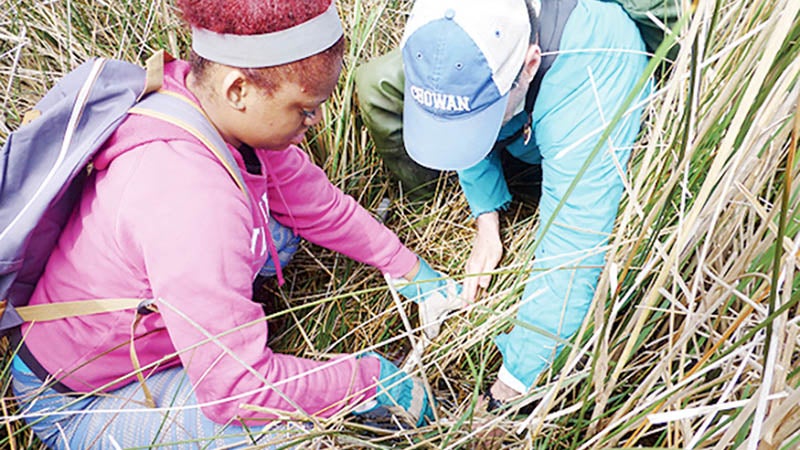Chowan University Biology Department featured by UNC-TV & Coastwatch magazine
Published 9:51 am Monday, March 6, 2017

- Chowan University student Neirah Howard assists researcher Bo Dame with collecting an aboveground biomass sample at Currituck Banks National Estuarine Research Reserve. | Photo Courtesy of the Chowan University Biology Department
By Amanda Bradshaw Sharpe
University Relations
MURFREESBORO – The Chowan University Biology Department was featured on UNC-TV on Feb. 8 for their collaborative research on the Outer Banks.
The UNC-TV news clip filmed Chowan University researchers taking core samples beneath the tall grasses of Currituck Sound. Currituck Sound is a unique area measuring three miles wide and 42 miles long. It begins at the south end of Kitty Hawk and ends at the north end of the Back Bay and the Virginia border. It is a large body of water, but not deep, ranging from one to three feet. Its only connection to the ocean is far south at Oregon Inlet, essentially making Currituck Sound filled with fresh water.
Although Currituck Sound is large and unique, there is not much known about it. This is the first study of Currituck Sound’s water quality, habitats, and wildlife. North Carolina Sea Grant helped fund the study, which will create a detailed habitat map of the area, and look at how the marsh is coping with rising sea levels. Researchers hope the multiple core samples will help to quantify whether or not the marsh is growing or eroding. Additionally, the study surveys which plants make up the marsh, and whether rising seas will speed up erosion, or if the marshes are capable of growing fast enough to keep up with erosion.
Dr. James “Bo” Dame, Associate Professor of Biology at Chowan University, states, “With climate change, there are predictions that sea level rise will go up from half a foot to a foot over the next 30 years.”
Following the UNC-TV segment, Coastwatch magazine released an article covering the research. Dr. Dame and Dr. Heather McGuire, Department of Biology Chair, discussed their involvement in the project.
“Brandon Puckett and Scott Crocker of the North Carolina Coastal Reserve sought to better understand the impacts of sea-level rise at their Currituck Banks National Estuarine Research Reserve site in Corolla, and Currituck Sound in general. As faculty in the biology department at Chowan University, we were interested in the effects of the sea-level rise, and had a desire to develop meaningful field experiences for undergraduates,” they shared.
The two organizations have a history of supporting each other on stewardship projects to include alternative spring breaks, and an annual coastal field-ecology class. They decided that adding a research component would be the natural next step. Partnering with Robbie Fearn, director of Audubon’s Pine Island Sanctuary in Corolla, which was the headquarters of much of the work, a grant proposal was developed. In spring 2016, the project was selected as part of the first round of the North Carolina Community Collaborative Research Grant Program. North Carolina Sea Grant provides funding in partnership with William R. Kenan Jr. Institute for Engineering, Technology, and Science based at North Carolina State University.
This experience allowed Chowan University students to participate in the field and lab activities, gaining invaluable hands-on experience.
“Students had the opportunity to learn about coastal barrier ecosystems and processes, climate change, sea-level rise and the habitat response, and habitat mapping. They also constructed litterbags for measuring decomposition and PVC quadrats and cores for collecting biomass. Classes in the field mapped wetlands, collected initial bio mass samples, deployed litterbags and established feldspar plots for measuring sediment accretion,” said Dr. Dame.
The research project and results will be featured in displays at the reserve and sanctuary starting in summer 2017. Kiosks placed along the popular trails will give an overview of the project and provide background information on climate change and sea-level rise.
“Due to the long timescale of natural processes, our project will not fully answer our fundamental research questions: ‘Can Currituck Sound wetlands accrete vertically and keep pace with rising seas, and how will wetland areas change?’ However, our project will increase understanding in a region where data are limited,” explained Chowan University Professor Dr. McGuire.
For more information about Chowan University, visit www.chowan.edu or call 1-888-4-CHOWAN.

